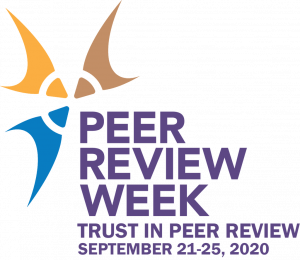 2020 marks the sixth annual celebration of Peer Review Week! The goal of this annual event is to acknowledge the importance that the peer review process plays in helping to maintain scientific quality. Peer review can be the most thankless part of the scholarly communications lifecycle--for reviewers it can be time-consuming but likewise entail minimal recognition. However, peer review is also central to helping ensure that things such as study design, data integrity, and the interpretation of results are clearly vetted. Consequently, peer review weeks strives to showcase the work of editors and reviewers, advance best practices, and highlight the latest applications.
2020 marks the sixth annual celebration of Peer Review Week! The goal of this annual event is to acknowledge the importance that the peer review process plays in helping to maintain scientific quality. Peer review can be the most thankless part of the scholarly communications lifecycle--for reviewers it can be time-consuming but likewise entail minimal recognition. However, peer review is also central to helping ensure that things such as study design, data integrity, and the interpretation of results are clearly vetted. Consequently, peer review weeks strives to showcase the work of editors and reviewers, advance best practices, and highlight the latest applications.
This year’s Peer Review Week theme is “Trust in Peer Review” and the objective is to underscore why peer review is central to the process of creating trust worthy content. As a result of the COVID-19 crisis, 2020 saw the rapid growth of preprint servers such as medRxiv, bioRxiv, and others. While the growth of preprint servers has helped to expedite the transmission of scientific information, the rapid rise in the dissemination of content prior to the peer reviewed process has likewise resulted in a greater potential for error. What will the relationship between preprints and peer-reviewed publications look like going forward? This will likely be one of the biggest questions in scholarly communications for 2021 and beyond.
Looking for some ways that you can help to celebrate Peer Review Week September 21st-September 25th?
- Teach a student how to structure an effective review.
- Recommend a younger colleague as a reviewer.
- Track your work as a peer reviewer through your publons or ORCID iD researcher profile.
- Or just finalize the review that has been sitting on your desk.
Happy Peer Review Week!


